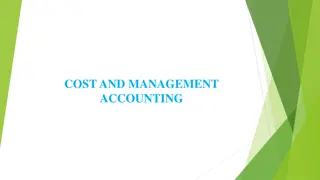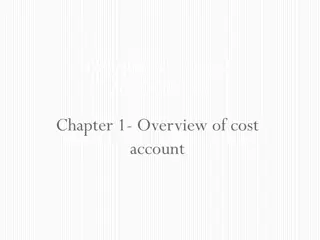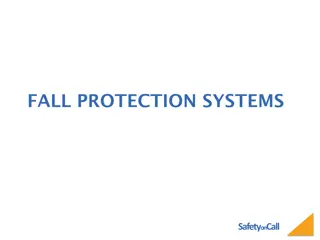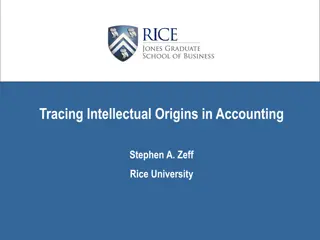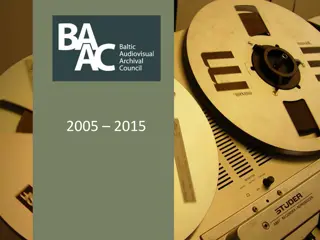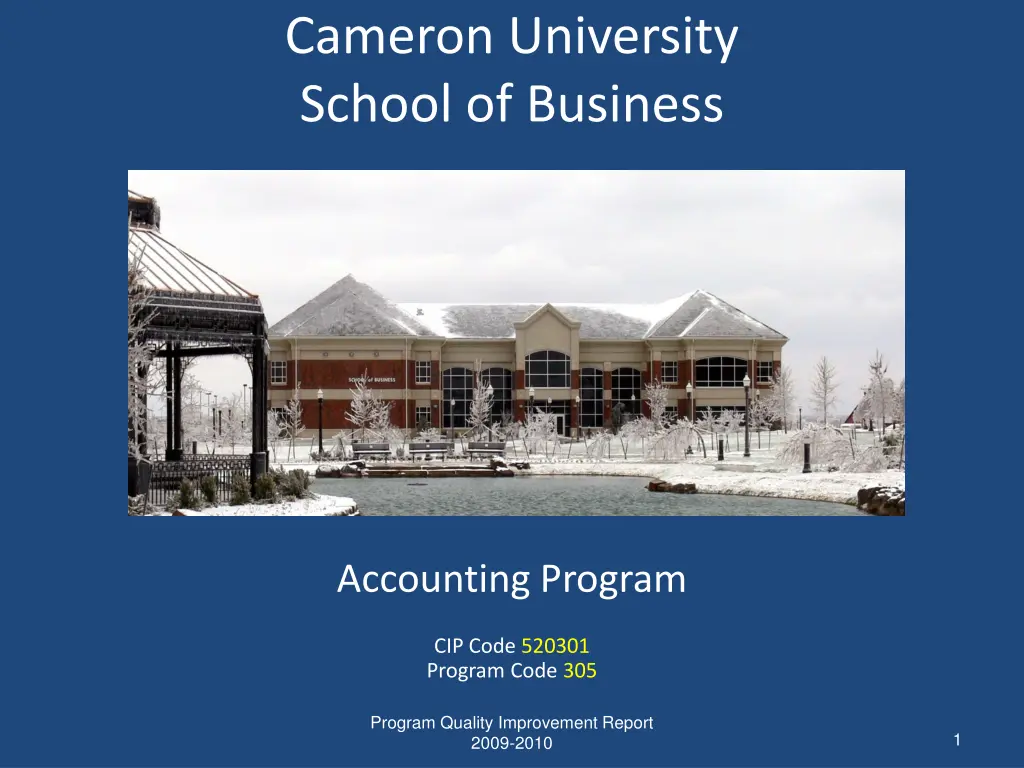
Cameron University School of Business Accounting Program Overview
Explore the student learning goals, outcomes, and alignment of the accounting program at Cameron University's School of Business. Accredited by ACBSP, the program focuses on developing essential skills for success in business and fostering a culture of continuous improvement. Discover how the program prepares students for leadership roles, promotes critical thinking, and emphasizes ethical behavior and lifelong learning.
Download Presentation

Please find below an Image/Link to download the presentation.
The content on the website is provided AS IS for your information and personal use only. It may not be sold, licensed, or shared on other websites without obtaining consent from the author. If you encounter any issues during the download, it is possible that the publisher has removed the file from their server.
You are allowed to download the files provided on this website for personal or commercial use, subject to the condition that they are used lawfully. All files are the property of their respective owners.
The content on the website is provided AS IS for your information and personal use only. It may not be sold, licensed, or shared on other websites without obtaining consent from the author.
E N D
Presentation Transcript
Cameron University School of Business Accounting Program CIP Code 520301 Program Code 305 Program Quality Improvement Report 2009-2010 1
Student-Learning Goals 1. Students demonstrate an understanding of the broad foundations of business. 2. Students demonstrate critical thinking skills necessary to make effective business decisions. 3. Students display the interpersonal skills conducive to positive business relationships. 4. Students analyze the competitive environment and develop integrative business strategies. Note: These goals were adopted by the entire School of Business faculty during the Summer of 2010. Program Quality Improvement Report 2009-2010 2
Student-Learning Outcomes Cameron s SCOB is Accredited by the Accreditation Council for Business Schools & Programs (ACBSP) ACBSP develops, promotes, and recognizes best practices that contribute to continuous improvement of business education, but no specific outcome is required by ACBSP. However, the goals of the School of Business and of the Accounting Program evolve around the best practices established by ACBSP. Those practices include: Leadership Continuous Improvement and Organizational Learning Faculty and Staff Participation and Development Partnership Development Design Quality Management by Fact Long-Range View Public Responsibility and Citizenship Fast Response Results Orientation http://www.roanoke.edu/business/ECBSP/acbsp-img2.jpg Program Quality Improvement Report 2009-2010 3
Relationship between Student Learning Goals & ACBSP Best Practices Leadership Continuous Improvement & Organizational Learning Results Orientation Faculty and Staff Participation & Development Fast Response 1. Broad Foundations of Business 2. Critical Thinking Skills 3. Interpersonal Skills 4. Develop Strategies Partnership Development Public Responsibility &Citizenship Long-Range View Design Quality Management by Fact Program Quality Improvement Report 2009-2010 4
Alignment of Accounting Program Outcomes Cameron Mission Statement Plan 2013 School of Business Outcomes Offer Quality Educational Opportunities Create Skilled Professionals Stimulate Economic Development Prepare Students for Success/Leadership Enhance Student Understanding of Businesses Create Student Center Approach to Learning Offer Experimental & Innovative Learning Opportunities Create Ethical Behavior Life Long Learning Create Opportunity for Students to contribute to a changing world Provide Cultural and Social Development Resource Management Create an Environment for an Open Exchange of Ideas 5
Measures of Learning and Service Outcomes 1. Direct measures of Student-Learning Outcomes Major Field Assessment Test (MFAT) Accounting Practice Set Projects Tax Research Reports Accounting Software Selection Reports Imbedded Multi-Choice Exam Questions Essays or Problem type Exam Questions Tax Return Projects Group Audit Projects Program Quality Improvement Report 2009- 2010 6
Measures of Learning and Service Outcomes 2. List all indirect measures of student-learning or service outcomes Entry into Graduate School Job Placement Rates IDEA Surveys Survey of Internship Supervisors Survey of Interns Survey of Students Survey of Faculty Survey of Graduates Program Quality Improvement Report 2009- 2010 7
Measures of Learning and Service Outcomes 3. Accounting Program Strategies that address shortfalls in student learning prior to graduation include: Tutorial Lab w/student workers Use MyAccountingLab to aid student learning Use an Introductory Accounting course Common syllabi elements for Acct 2013 and Acct 2023 Use Accounting Club to improve accounting student network Program Quality Improvement Report 2009- 2010 8
Results from 2009-2010 Action Plan Action Plan Create Advisory Board SCOB Goal Affected ...# 1 Broad Foundations of Action Plan Results .Student Advisory Board and an Advisor Board of Southwest Oklahoma business leaders Desired Outcomes ..To improve program through listening to students and business leaders ideas Measureable Improvements..All measures should improve over time. Business Program Quality Improvement Report 2009-2010 9
Results from 2009-2010 Action Plan Action Plan Create Accounting Club SCOB Goal Affected ...# 1# 2, # 3, & # 4 Action Plan Results .Create Accounting Club Desired Outcomes ..To create an atmosphere between accounting students in which upper division accounting students can be mentors for newer students. Measureable Improvements..All measures should improve over time. Program Quality Improvement Report 2009-2010 10
Data Comparison of Internal Measures for Goal # 1 Goals # 1: Students will demonstrate an understanding of the broad foundations of business. Comparison of Goal # 1 Internal Measurements 100% 95% 90% 85% 80% 75% 70% 65% 60% 2004 2005 2006 2007 2008 2009 Manual Accounting Practice Sets AIS Computerized Acctg Program Tax Research Reports Audit Simulation Program Quality Improvement Report 2009-2010 11
Results from 2009-2010 Action Plan Action Plan Improve Tutorial Lab SCOB Goal Affected ...# 1, # 2 & # 3 Action Plan Results .Open Lab, Staff Lab to Enhance student learning and to Reduce Student Attrition Desired Outcomes ..To improve students accounting knowledge by providing a common place to interact with other accounting students where help is available. Measureable Improvements..All measures should improve over time. Program Quality Improvement Report 2009-2010 12
Results from 2009-2010 Action Plan Financial Accounting 2013 Withdrawal Rates 30.00% 25.00% 20.00% 15.00% 10.00% 5.00% 0.00% SP07 FA07 SP08 Semester FA08 SP09 Program Quality Improvement Report 2009-2010 13
Results from 2009-2010 Action Plan Action Plans that were NOT accomplished but remain on the list of future actions include: Course in International Accounting Standards Add an Ethics course Program Quality Improvement Report 2009-2010 14
Student-Learning Outcomes and Measurements Goals # 1: Students will demonstrate an understanding of the broad foundations of business. MEASUREMENTS OF STUDENT LEARNING OR SERVICE OUTCOME Methods used to determine validity of measurement instruments Methods used to determine reliability of measurements CURRICULUM AREA OR TARGET AUDIENCE PROGRAM OUTCOME Schedule for measurements Measurements 1. Evaluate and solve business problems. 1a. Business Policy (BUS 4633) 1. Major Field Assessment Test (Direct) 1. Concurrent Validity 1. Inter-rater Reliability 1. By Semester 2. Analyze and record business transactions; prepare accounting reports. 2a. Accounting Information Systems (ACCT 4513) 2b. Intern Supervisor Report 2a. Manual Accounting Practice Set (Direct) 2b. Intern Supervisor Questionnaire (Indirect) 2a. Content Validity 2b. Construct Validity 2a. Intra-rater Reliability 2b. Intra-rater Reliability 2a. By Semester 2b. By Semester Program Quality Improvement Report 2009-2010 15 15
Student-Learning Outcome and Measurements Goals # 1: Students will demonstrate an understanding of the broad foundations of business. MEASUREMENTS OF STUDENT LEARNING OR SERVICE OUTCOME Methods used to determine validity of measurement instruments Methods used to determine reliability of measurements CURRICULUM AREA OR TARGET AUDIENCE PROGRAM OUTCOME Schedule for measurements Measurements 3. Use computer software to prepare accounting records and reports. 3a. Accounting Information Systems ( ACCT 4513) 3b. Intern Supervisor Report 3a. Computerized Accounting Practice Set (Direct) 3b. Intern Supervisor Questionnaire (Indirect) 3a. Content Validity 3a. Intra-rater Reliability 3a. Each time course is offered 3b. By Semester 3b. Construct Validity 3b. Intra-rater Reliability 4. Construct Validity 4. Intra-rater Reliability 4. Fall Semester 4. Tax Research Report (Direct) 4. Perform tax planning research to improve decision making. 4. Individual Income Tax (ACCT 4013) Program Quality Improvement Report 2009-2010 16 16
Student-Learning Outcome and Measurements Goals # 1: Continued MEASUREMENTS OF STUDENT LEARNING OR SERVICE OUTCOME Methods used to determine validity of measurement instruments Methods used to determine reliability of measurements CURRICULUM AREA OR TARGET AUDIENCE PROGRAM OUTCOME Schedule for measurements Measurements 4. Analyze cost structures to improve profits 5. Plan and perform a financial statement audit. 4. Cost Accounting (ACCT 3133) 4. (TBD) 4. (TBD) 4. (TBD) 4. (TBD) 5. Auditing (ACCT 4213) 5. Simulated Audit Practice Set (Direct) 5. Content Validity 5. Intra-rater Reliability 5. Spring Semester Program Quality Improvement Report 2009-2010 17 17
Student-Learning Outcome and Measurements Goal # 2: Students will demonstrate critical thinking skills necessary to make effective business decisions. MEASUREMENTS OF STUDENT LEARNING OR SERVICE OUTCOME Methods used to determine validity of measurement instruments Methods used to determine reliability of measurements CURRICULUM AREA OR TARGET AUDIENCE PROGRAM OUTCOME Schedule for measurements Measurements 1. Use cognitive skills to identify accounting office problems and to formulate solutions 1. Accounting Internship (ACCT 4483) 1. Multiple measures from the Internship Supervisor Survey (Indirect) 1. Construct Validity 1. Intra-rater Reliability 1. Every Semester 2a. Average of SUA and QB Projects (Direct) 2b. Average of Intern Supervisor Acct Skill, Computer Skills and Problem Solving Skills (Indirect) 2a. Accounting Information Systems (ACCT 4513) 2b. Accounting Internship Report 2. Use cognitive skills to analyze and record business transactions; and in preparing accounting reports. 2a. Content Validity 2a. Intra-rater Reliability 2a. Each time course is offered 2b. Each time course is offered 2b. Construct Validity 2b. Intra-rater Reliability Program Quality Improvement Report 2009-2010 18 18
Student-Learning Outcome and Measurements Goal # 2: Continues MEASUREMENTS OF STUDENT LEARNING OR SERVICE OUTCOME Methods used to determine validity of measurement instruments Methods used to determine reliability of measurements CURRICULUM AREA OR TARGET AUDIENCE PROGRAM OUTCOME Schedule for measurements Measurements 3. Use cognitive skills to perform tax planning research for improved decision making 4. Use cognitive skills to plan and perform a financial statement audit. 3. Individual Income Tax (ACCT 4013) 3. Tax Research Report (Direct) 3. Construct Validity 3. Intra-rater Reliability 3. Fall Semester 4. Auditing (ACCT 4213) 4. Simulated Audit Practice Set (Direct) 4. Content Validity 4. Intra-rater Reliability 4. Spring Semester Program Quality Improvement Report 2009-2010 19 19
Student-Learning Outcome and Measurements Goal # 3: Students will display the interpersonal skills conducive to positive business relationships. MEASUREMENTS OF STUDENT LEARNING OR SERVICE OUTCOME Methods used to determine validity of measurement instruments Methods used to determine reliability of measurements CURRCULUM AREA OR TARGET AUDIENCE PROGRAM OUTCOME Schedule for measurements Measurements 1. Students will display the interpersonal skills required to effectively work in groups. 2. Students will display the interpersonal skills required to effectively work in an office environment. 1. Auditing (ACCT 4213) 1. Simulated Audit Practice Set (Direct) 1. Content Validity 1. Intra-rater Reliability 1. Spring Semester 2. Internship Supervisor Survey (Indirect) 2. Accounting Internship (ACCT 4483) 2. Construct Validity 2. Intra-rater Reliability 2. Every Semester Program Quality Improvement Report 2009-2010 20 20
Student-Learning Outcome and Measurements Goals # 4: Students will be able to analyze the competitive environment and develop integrative business strategies. MEASUREMENTS OF STUDENT LEARNING OR SERVICE OUTCOME Methods used to determine validity of measurement instruments Methods used to determine reliability of measurements CURRICULUM AREA OR TARGET AUDIENCE PROGRAM OUTCOME Schedule for measurements Measurements 1. Utilizing tax knowledge to develop business strategy. 2. Utilizing cost accounting knowledge to develop business strategy. 3. Utilizing financial accounting knowledge to develop business strategy. 1. Individual Income Tax (ACCT 4013) 1. (TBD) 1. (TBD) 1. (TBA) 1. (TBA) 2. (TBD) 2. (TBD) 2. (TBA) 2. (TBA) 2. Cost Accounting (ACCT 3133 3. (TBD) 3. (TBD) 3. (TBA) 3. (TBA) 3. Financial Accounting (TBD) Program Quality Improvement Report 2009-2010 21 21
Display of Assessment Data Program Quality Improvement Report 2009-2010 22
Goals # 1: Students will demonstrate an understanding of the broad foundations of business. Program Outcome # 3: Use computer software to prepare accounting records and reports. Computer & Accounting Software Skills 100% 19 95% 36 34 31 21 90% 23 85% 80% 10 10 75% 70% 6 65% 60% 2004 2005 2006 2007 2008 2009 AIS Computerized Acctg Program Intern Supervisor Feedback on Computer Skills Program Quality Improvement Report 2009-2010 23
Goals # 2: Students will demonstrate critical think skills necessary to make effective business decisions. Program Outcome # 1: Use cognitive skills to identify accounting office problems and to formulate solutions. Using Cognitive Skills in the Office 100% 95% -Adaptability 90% -Initiative 85% 80% -Organizational skills 75% -Telephone skills/etiquette 70% 65% -Verbal language 60% 2007 2008 2009 2010 Program Quality Improvement Report 2009-2010 24
Goals # 3: Students will display the interpersonal skills conducive to positive business relationships. Program Outcome # 2: Students will display the interpersonal skills required to effectively work in an office environment. Interpersonal Skills in the Office 100% 95% 90% 85% 80% 75% 70% 65% 60% 2007 2008 2009 2010 -Interpersonal skills Program Quality Improvement Report 2009-2010 25
Goals # 1: Students will demonstrate an understanding of the broad foundations of business. MFAT Accounting Scores compared to Nat'l Average 60 55 50 Percent 45 40 35 30 Program Quality Improvement Report 2009-2010 26
Action Plan 1. Increase Computer and Software training 2. Improve Office Skills/Professionalism 3. Improve Interpersonal Skills Program Quality Improvement Report 2009-2010 27
Action plan for Student-Learning or Service Outcomes Action Timeline Human / Fiscal Resources Req d Increase Computer & Software Training Spring 2010 None Improve Office Skills Spring 2010 None Improve Interpersonal Skills Spring 2010 Lectureship Grant Program Quality Improvement Report 2009-2010 28
Published Data Accounting Graduates /Academic Year 50 G r a d u a t e s 45 45 40 35 34 30 32 25 24 20 15 10 5 0 2005-06 2006-07 2007-08 2008-09 Academic Year Program Quality Improvement Report 2009-2010 29
Program Quality Improvement Report 2009-2010 30

